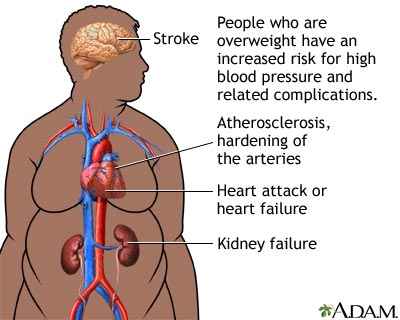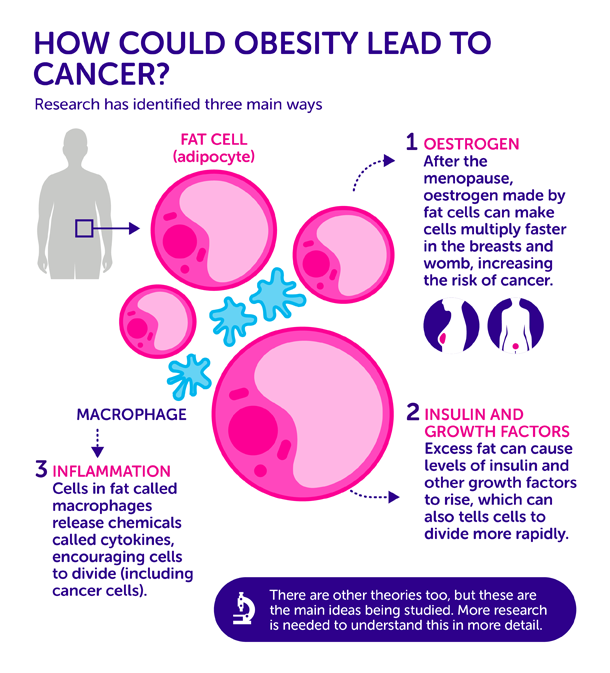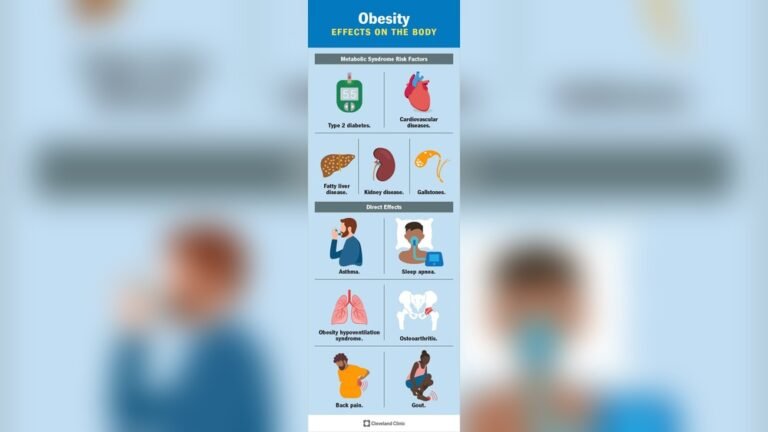Are you aware of how obesity might be affecting your body beyond just the number on the scale? Understanding what obesity causes is crucial because it impacts much more than your appearance.
From heart health to mental well-being, the effects can be serious and far-reaching. If you want to protect your health and feel better in your own skin, it’s important to know exactly what risks obesity brings. Keep reading to discover the hidden dangers and how they might be influencing your life right now.

Credit: www.healthline.com
Cardiovascular And Metabolic Problems
Obesity affects the heart and metabolism in many harmful ways. It raises the chance of serious health problems that impact daily life. These problems include heart disease, stroke, and issues with blood pressure and cholesterol. Metabolic syndrome, a group of risk factors, also becomes more common with obesity. Understanding these conditions helps highlight why managing weight is so important.
Heart Disease Risks
Excess fat causes fatty deposits in arteries. These deposits narrow the arteries and reduce blood flow. The heart must work harder, which can lead to heart attacks. Obesity also increases inflammation, damaging heart tissues. People with obesity have a much higher chance of developing heart disease.
Stroke And Artery Health
Obesity damages arteries throughout the body, not just the heart. Fatty buildup can block blood flow to the brain. This blockage causes strokes, which can lead to serious disability or death. Artery damage also weakens vessel walls, increasing stroke risk. Maintaining a healthy weight supports better artery health.
High Blood Pressure Effects
Obesity often causes high blood pressure, known as hypertension. Extra body fat makes the heart pump harder, raising blood pressure. High blood pressure strains the heart and arteries. It increases the risk of heart attacks, stroke, and kidney damage. Losing weight can help lower blood pressure and ease these risks.
Cholesterol Imbalances
Obesity can raise bad cholesterol (LDL) and lower good cholesterol (HDL). High LDL levels cause fatty deposits in arteries. Low HDL reduces the body’s ability to clear cholesterol. This imbalance speeds up artery damage and heart disease. Healthy eating and weight control improve cholesterol levels.
Metabolic Syndrome Impact
Metabolic syndrome is a group of conditions linked to obesity. It includes high blood pressure, high blood sugar, and abnormal cholesterol levels. These conditions increase the risk of heart disease, stroke, and type 2 diabetes. Controlling weight and lifestyle changes can reduce metabolic syndrome risks.
Cancer Connections
Obesity does more than affect appearance or energy levels. It raises the risk of serious health problems, including cancer. The link between obesity and cancer is strong and well-studied. Understanding this connection helps highlight why weight management is vital for health.
Types Linked To Obesity
Several cancers show a clear connection to obesity. These include breast cancer, especially in postmenopausal women. Colon cancer risk also rises with excess body weight. Endometrial cancer, which affects the uterus lining, is more common in obese individuals. Kidney cancer and esophageal cancer rates increase as well. Obesity may also raise the chance of pancreatic and liver cancers. Each type links to how fat tissue affects the body’s functions.
Mechanisms Behind Cancer Risks
Fat tissue produces hormones and chemicals that can promote cancer growth. Excess fat increases levels of estrogen, which fuels some cancers like breast and endometrial cancers. Obesity causes chronic inflammation, which can damage cells and DNA over time. Higher insulin and insulin-like growth factor levels also encourage cancer cell growth. These factors create an environment where cancer can start and spread more easily. Weight gain changes the body’s normal balance, increasing cancer risk.
Breathing And Respiratory Issues
Obesity can cause serious breathing and respiratory issues. Excess weight puts pressure on the lungs and airways. This makes it harder to breathe properly. The risks of breathing problems increase as body weight rises. These issues often reduce oxygen levels in the blood. They can also affect sleep quality and daily energy. Understanding these problems helps highlight the importance of healthy weight management.
Sleep Apnea Challenges
Sleep apnea occurs when breathing stops during sleep. Obesity increases fat around the neck and throat. This narrows the airway and blocks airflow. People with obesity often snore loudly and feel tired during the day. Sleep apnea can cause poor sleep and raise heart risks. Treating obesity may reduce sleep apnea symptoms and improve breathing.
Asthma And Obesity
Obesity can worsen asthma symptoms and attacks. Extra weight causes inflammation in the body. This inflammation can irritate the airways and make asthma worse. People with obesity and asthma may have more severe breathing troubles. Managing weight helps reduce asthma flare-ups and improves lung function. Controlling both conditions is important for better breathing health.

Credit: medlineplus.gov
Joint And Musculoskeletal Strain
Excess body weight puts serious strain on joints and muscles. This pressure affects movement and causes pain. Over time, joints wear down faster. Muscles and bones struggle to support the added weight. This stress leads to many joint and musculoskeletal issues. Understanding these problems helps highlight the risks of obesity on the body’s structure.
Osteoarthritis Development
Osteoarthritis occurs when joint cartilage breaks down. Extra weight increases pressure on cartilage, especially in knees and hips. This pressure speeds up cartilage damage and loss. Without cartilage, bones rub directly against each other. This causes pain, swelling, and stiffness in joints. Obesity significantly raises the chance of developing osteoarthritis. Joint pain often limits daily activities and lowers life quality.
Other Musculoskeletal Disorders
Obesity also raises the risk of other musculoskeletal problems. These include back pain, tendonitis, and muscle strains. Excess weight changes posture and balance, stressing muscles and ligaments. This stress can cause inflammation and injuries. Over time, bones may weaken or deform. These disorders reduce mobility and cause chronic discomfort. Managing weight helps reduce these risks and improve overall joint health.
Gallbladder And Pancreas Disorders
Obesity can seriously affect the gallbladder and pancreas. These organs play key roles in digestion and metabolism. Excess weight raises the risk of disorders in both organs. Understanding these problems helps highlight the dangers obesity brings.
Gallstones Formation
Obesity increases the chance of gallstones. Gallstones are hard particles that form in the gallbladder. They develop when bile contains too much cholesterol. Excess weight raises cholesterol levels in bile. This imbalance causes crystals that turn into stones.
Gallstones can block bile flow and cause pain. They may lead to infections or inflammation. Obese individuals often have faster bile cholesterol saturation. This speeds up stone formation. Losing weight too quickly can also trigger gallstones. Managing weight carefully is important for gallbladder health.
Pancreatic Health Risks
Obesity puts pressure on the pancreas. This organ produces enzymes and insulin. Excess fat may cause pancreatic inflammation. This condition is called pancreatitis. It can cause severe abdominal pain and digestive issues.
Obesity also raises the risk of pancreatic cancer. Fat tissue produces substances that may promote cancer growth. High insulin levels linked to obesity can stimulate tumor cells. Maintaining a healthy weight supports better pancreatic function and lowers these risks.
Kidney Disease Risks
Obesity greatly increases the risk of kidney disease. Excess body weight strains the kidneys, affecting their ability to filter waste. This strain can lead to chronic kidney disease (CKD) and even kidney failure. Understanding these risks can help people take steps to protect their kidney health.
How Obesity Affects Kidney Function
Extra fat tissue causes inflammation in the body. This inflammation damages kidney cells over time. The kidneys then work harder to filter blood. Constant overwork reduces kidney efficiency and causes scarring.
Link Between Obesity And High Blood Pressure
Obesity often leads to high blood pressure. High blood pressure narrows blood vessels in the kidneys. Narrow vessels reduce blood flow and cause kidney damage. This damage raises the chance of kidney failure.
Obesity And Diabetes Impact On Kidneys
Obesity increases the risk of type 2 diabetes. Diabetes harms the small blood vessels in the kidneys. This damage prevents proper filtering of waste. Diabetic kidney disease is a common cause of kidney failure.
Preventing Kidney Disease In Obese Individuals
Maintaining a healthy weight lowers kidney disease risks. Regular exercise and a balanced diet improve kidney health. Monitoring blood pressure and blood sugar also helps. Early treatment can slow kidney damage and improve outcomes.
Pregnancy Complications
Obesity can cause serious problems during pregnancy. Excess weight increases risks for both mother and baby. Pregnancy complications linked to obesity need careful attention. Two common issues are gestational diabetes and pre-eclampsia. These conditions can affect pregnancy outcomes and long-term health.
Gestational Diabetes
Gestational diabetes occurs when blood sugar levels rise during pregnancy. Obesity raises the chance of developing this condition. High blood sugar can harm the baby’s growth and health. It may cause the baby to grow too large, making delivery difficult. Mothers with gestational diabetes face higher risk of type 2 diabetes later in life. Managing weight before and during pregnancy helps reduce this risk.
Pre-eclampsia Concerns
Pre-eclampsia is a pregnancy disorder marked by high blood pressure. Obesity makes pre-eclampsia more likely to develop. This condition can damage organs like the liver and kidneys. It also reduces blood flow to the baby, affecting growth. Pre-eclampsia can cause serious complications for both mother and child. Early monitoring and treatment are essential to protect health.

Credit: blog.dana-farber.org
Mental And Emotional Health
Obesity affects more than just the body. It also impacts mental and emotional health deeply. Many people with obesity face challenges that affect their mood and self-view. These issues can influence daily life and overall wellbeing.
Depression And Anxiety Links
Obesity and depression often occur together. People with obesity may feel sad or hopeless more often. Anxiety can also increase due to social stigma and health worries. These mental health problems can make weight management harder. Treating both conditions is important for better health.
Self-esteem And Body Image
Body image struggles are common in obesity. Many individuals feel unhappy with their appearance. This lowers self-esteem and confidence in social settings. Negative self-image can lead to isolation or avoiding activities. Support and positive reinforcement help improve self-worth.
Eating Disorders Association
Obesity sometimes links with eating disorders. Binge eating disorder is one example. It involves eating large amounts of food quickly and feeling out of control. Emotional stress often triggers these behaviors. Professional help is needed to address both obesity and eating disorders.
Digestive System Effects
Obesity affects many parts of the body, including the digestive system. The extra weight puts pressure on organs and changes how they work. This can cause several digestive problems. Understanding these effects helps to see why managing weight is important for digestive health.
Gastro-oesophageal Reflux Disease (gord)
Obesity raises the risk of Gastro-oesophageal Reflux Disease, or GORD. This happens when stomach acid flows back into the food pipe. The acid causes burning pain in the chest, known as heartburn. Excess belly fat pushes on the stomach, making acid reflux more common. GORD can also lead to damage in the food pipe if untreated.
Other Digestive Challenges
Obesity often causes other digestive problems too. It increases the chance of developing gallstones. These are hard deposits that form in the gallbladder and cause pain. Fatty liver disease is also common. Extra fat builds up in the liver, leading to inflammation and damage. Obesity may slow digestion, causing constipation and bloating. These issues reduce comfort and affect daily life.
Conclusion
Obesity causes many serious health problems. It raises the risk of heart disease and stroke. Breathing difficulties and joint pain also occur more often. Some cancers happen more in people with obesity. Mental health issues, like depression, can increase too.
These effects show why controlling weight is important. Small changes in diet and exercise help a lot. Staying active and eating healthy supports overall well-being. Taking care of your body protects your future health.


